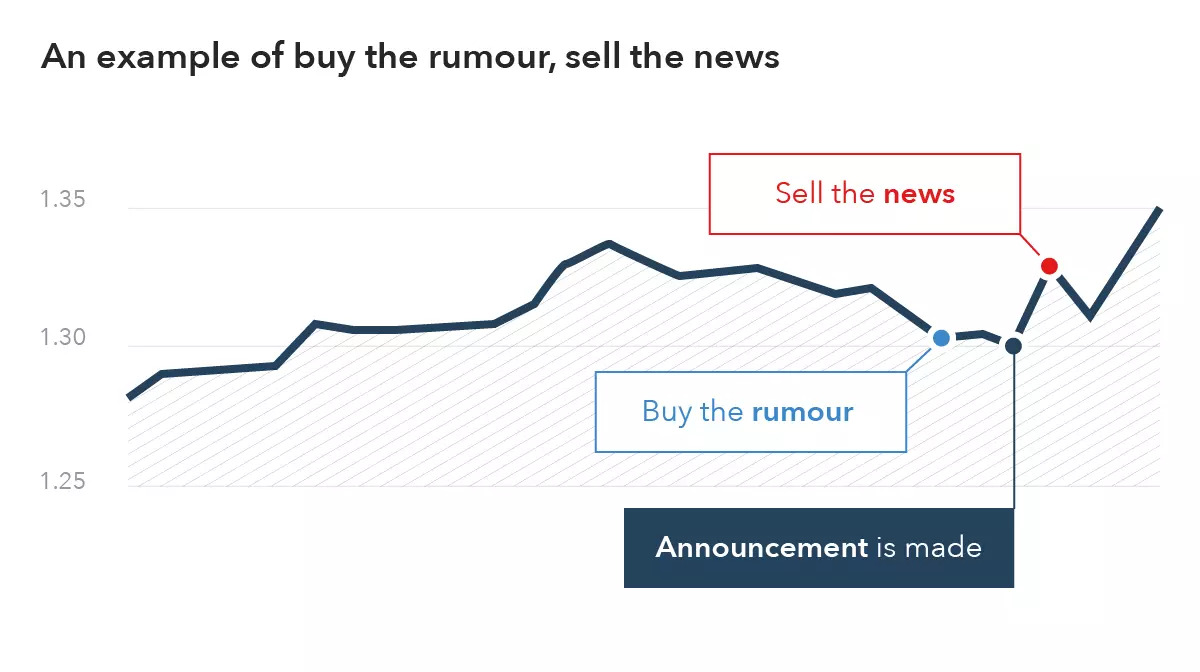In the world of trading, the phrase "buy the rumor sell the news" is a time-tested adage that reflects the powerful influence of expectations and market psychology. This strategy involves entering a position based on speculation or anticipated news, then exiting once the actual announcement is made.
While potentially lucrative, it requires a keen understanding of market sentiment, timing, and risk management. In this article, we'll explore how to use this approach effectively, examine real-world scenarios, and outline the key risks and best practices.
What Does "Buy the Rumor Sell the News" Mean?

At its core, "buy the rumor sell the news" means purchasing an asset when rumours or forecasts about positive news begin circulating, and selling it once the news is officially released. The logic is that prices often rise in anticipation of good news, as traders position themselves ahead of the event. However, when the news finally breaks, the price may fall or stall, as the event's impact is already "priced in" and early traders take profits.
This strategy is not limited to equities; it is widely used in forex, commodities, and even cryptocurrency markets. The key is to anticipate how the market will react to upcoming news or events and to act before the majority.
Why Does This Strategy Work?
Financial markets are driven by expectations as much as by actual results. When rumours or speculation about a positive development surface—such as a company's strong earnings, a central bank rate cut, or a major product launch—traders and investors often rush to buy in anticipation. This collective buying pushes prices higher.
Once the anticipated news is confirmed, there may be little new information to sustain the rally. Traders who bought early may start selling to lock in profits, causing prices to drop or consolidate. In some cases, even positive news can lead to a sell-off if it fails to exceed already-high expectations.
Real-World Examples
Example 1: Corporate Earnings
Suppose rumours circulate that a technology company will report record earnings. Traders begin buying shares, driving the price up ahead of the announcement. When the earnings are released—even if they are strong—the share price may fall as traders sell to realise gains, or because the results were already expected.
Example 2: Central Bank Decisions
In forex markets, speculation about an interest rate hike by the Bank of England can send sterling higher in anticipation. When the rate hike is officially announced, the currency may drop as traders sell to take profits, or if the hike was already fully priced in.
Example 3: Economic Data Releases
Before the release of key economic data, such as employment figures or inflation rates, markets often move based on forecasts and rumours. Once the data is published, the initial move may reverse as traders react to the reality versus expectations.
How to Apply the Strategy
1. Identify High-Impact Events
Look for upcoming events that are likely to move markets, such as earnings reports, central bank meetings, economic data releases, or major corporate announcements. These events are often preceded by speculation and increased trading activity.
2. Monitor Market Sentiment
Stay attuned to financial news, analyst reports, and social media for emerging rumours or shifts in sentiment. Tools like economic calendars and news feeds can help you track relevant events.
3. Time Your Entry
Enter your position when the rumour is gaining traction, but before the majority of the market has acted. This requires quick decision-making and a willingness to act on incomplete information.
4. Plan Your Exit
Decide in advance when you will exit the trade—ideally just before or as the news is released. Avoid holding on in the hope of further gains, as the price may quickly reverse once the news is public.
5. Use Risk Management
Because this strategy can be volatile, always use stop-loss orders and manage your position size. Be prepared for unexpected outcomes, such as the news contradicting the rumour or the market reacting in an unforeseen way.
Risks and Limitations
False Rumours: Not all rumours are accurate. Acting on unsubstantiated information can lead to losses if the expected news does not materialise.
Market Volatility: Prices can swing sharply around major events, increasing the risk of slippage and unexpected losses.
Crowded Trades: If too many traders anticipate the same outcome, the move may be less pronounced or reverse quickly after the news.
Emotional Trading: The strategy requires discipline and objectivity—emotional reactions can lead to poor timing and losses.
Best Practices and Tips
Verify Sources: Use multiple reliable sources to confirm rumours before acting.
Stay Objective: Don't let hype or fear cloud your judgement; stick to your trading plan.
Combine with Analysis: Use technical and fundamental analysis to support your decisions.
Practise Patience: Sometimes the best move is to wait for clearer signals or confirmation.
Review and Learn: After each trade, review what worked and what didn't to refine your approach.
Conclusion
In conclusion, the "buy the rumor sell the news" strategy can be a powerful way to profit from market psychology and anticipation, but it is not without risks. Success requires research, discipline, and a solid risk management plan.
By understanding how markets react to expectations and news, traders can position themselves to take advantage of volatility and make more informed decisions.
Disclaimer: This material is for general information purposes only and is not intended as (and should not be considered to be) financial, investment or other advice on which reliance should be placed. No opinion given in the material constitutes a recommendation by EBC or the author that any particular investment, security, transaction or investment strategy is suitable for any specific person.







